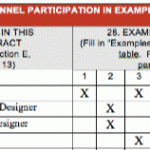
“Yes, it kind of is,” admitted the agency employee sitting across from me. Even they knew it.
And the older I get, the more procurements I’m involved in…
…the clearer it becomes.
Let me explain.
Remember the board games you played as a kid? My favorites were Hungry Hungry Hippos, Monopoly, Risk, and Sorry. As a child, those made up my board game world.
But as a parent, I walk into Toys R Us and I’m confronted by a wall of games. Now there is a mustache game, several princess games, and even an Olaf game.
Each game has a unique set of rules. If you don’t understand those rules, you’ll surely lose. If you don’t use the rules to your advantage, even a child can beat you.
Procurement Is A Wall Of Games
When you submit a proposal, you are participating in a game. And like that wall at Toys R Us, each game has its own rules.
The rules surrounding your proposal to the Maryland State Highway Administration are completely different than the rules used by the California Department of Transportation. And those rules are completely different than those used by the Texas Department of Transportation. And the Army Corps of Engineers has its own set of rules. So does Pfizer, etc.
The subtle differences in these games often have a substantial influence on your chances of success.
Take, for example, how some clients might evaluate your firm’s understanding. One client might rate you on your insight into their project and needs. Another might rate you solely on your ability to spit back what they’ve listed in their RFP. A different client might rate you on your ability to articulate their preferences. Still another, might completely ignore what you’ve written about your understanding and not use it in their evaluation.
How can you win in that situation if you don’t understand the rules used for that particular game?
When price is part of the game, it gets even more complicated. Even in Federal “best value” procurements, a competitor can submit such a low price that it would be nearly impossible for a client to hire you.
What A Fool I Was
When I was a young man starting out in this business, I just assumed you had to go into every procurement with your best qualifications, best approach, and best price. What more could you do, right?
And when I saw a “lesser” firm win, I just figured the client made a stupid decision.
I was wrong. I didn’t understand the game being played around me.
Whether you like it or not, you are playing a game. And games are just that…games.
You must take the time to learn the rules, play strategically, and use the game to your advantage.
When you plan to play your hand in a procurement, you must approach each as a unique game.
Now, it’s your turn. Do you view procurement as a game? If not, why?
If you do, share one example of how one of these games is played by posting a comment below.





Your exactly right, procurement is a game and the rules are different for each entity. For example, we often come across RFPs which are identical, but released by different entities. Although the RFPs are similar, the process behind the RFP may be different, such as how many evaluators, who is completing the evaluation, is there an interview process after submission, is the design firm involved in the decision or just providing support to the evaluators, etc… If you don’t familiarize yourself with the overall process, you could very well be left out of the next steps in the process. If an interview or presentation follows, it is also important to understand the culture and expectation of the those involved. There’s a big difference between a presentation and an interview. Presentations suggest a more formal process, whereas interviews can be either formal or more casual. Either way you need to be prepared and understand what your team is walking into.
Great example, Matt. Thank you for joining the conversation. 🙂
Interestingly, I learned last week that some of our clients are actually annoyed by our strategic maneuvers. One in particular doesn’t like it when they see a team of people that knows everyone on interview panel—something we thought was always a good move. Another example is how some of our clients feel very strongly that the project manager’s qualifications trump all other key staff and firm qualifications. Getting to know your clients’ preferences is definitely a big part of the game. Excellent analogy, Matt!
Thanks Emily. Great examples. Thank you for sharing.
The fact is, if you’re going to submit, you have to submit to win. You can’t just aim for getting on the short-list. Two examples: In the first, the principal told me there were five contracts, the short list would be ten firms, and just get him on the short list. Given the time I was allowed to spend and the help I got from technical folks, I felt good when I got #8, but the client only short-listed 7. Second example, submitting an SOQ knowing that it would be followed by a technical proposal and an interview. But this was a “must win” submittal, so I was allowed to work on only this one for 30 days. Our SOQ beat the #2 ranked SOQ by 400 points and we were selected from the SOQ. The client decided there was no reason to bother with steps 2 and 3 of their process. Bottom line: once you figure out the game, play to win or don’t play at all.